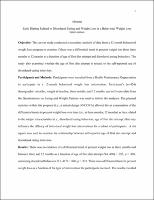Please use this identifier to cite or link to this item:
https://hdl.handle.net/20.500.12202/8908| Title: | Early dieting related to disordered eating and weight loss in a behavioral weight loss intervention |
| Authors: | Swendionis, Charles Wylie-Rosett, Judith Weinberger, Andrea Insull, Astrid Marcus |
| Keywords: | Clinical psychology |
| Issue Date: | Jan-2023 |
| Publisher: | Yeshiva University |
| Citation: | Insull, A. M. (2023, January). Early dieting related to disordered eating and weight loss in a behavioral weight loss intervention (Publication No. 30486605) [Doctoral dissertation, Yeshiva University]. PDTG |
| Series/Report no.: | Ferkauf Doctoral Dissertations;Publication No. 30486605 |
| Abstract: | Objective: The current study conducted a secondary analysis of data from a 12-month behavioral weight loss program to examine if there was a differential trend in percent weight loss from three months to 12 months as a function of age of first diet attempt and disordered eating behaviors. The study also examined whether the age of first diet attempt is related to the self-reported use of disordered eating behaviors. ¶ Participants and Methods: Participants were recruited from a Health Maintenance Organization to participate in a 12-month behavioral weight loss intervention. Participant’s (n=424) demographic variables, weight at baseline, three months, and 12 months, and self-report data from the Questionnaire on Eating and Weight Patterns was used to inform the analyses. The planned statistics within this proposal (i.e., a mixed-design ANCOVA) allowed for an examination of the differential trends in percent weight loss over time (i.e., at three months; 12 months) as they related to the subject characteristics (i.e., disordered eating behaviors; age of first diet attempt) that may influence the efficacy of behavioral weight loss interventions for a subset of participants. A chi square was used to examine the relationship between self-reported age of first diet attempt and disordered eating behaviors.¶ Results: There was no evidence of a differential trend of percent weight loss at three months and between three and 12 months as a function of age of first diet attempt F(4, 408) = .023, p = .896. and eating disordered behaviors F(1, 417) = .046, p = .831. There was a differential trend in percent weight loss as a function of the type of intervention the participants received. The results revealed a significant relationship between the age of first diet attempt and the use of disordered eating behaviors X2(4) = 34.13, p < .01. ¶ Conclusions: The age of first diet attempt and the use of disordered eating behaviors were not related to weight loss at three months and 12 months. Participants within the computer/intervention conditions lost significantly more weight between baseline and three months than three months to 12 months. Dieting age was related to participants using disordered eating behaviors. |
| Description: | Doctoral dissertation, PhD / Open Access |
| URI: | https://hdl.handle.net/20.500.12202/8908 https://ezproxy.yu.edu/login?url=https://www.proquest.com/dissertations-theses/early-dieting-related-disordered-eating-weight/docview/2811485513/se-2?accountid=15178 |
| ISBN: | 9798379507428 |
| Appears in Collections: | Ferkauf Graduate School of Psychology: Doctoral Dissertations |
Files in This Item:
| File | Description | Size | Format | |
|---|---|---|---|---|
| Insull_Dissertation_PDF Jan 2023 OA.pdf | 407.85 kB | Adobe PDF |  View/Open |
This item is licensed under a Creative Commons License

